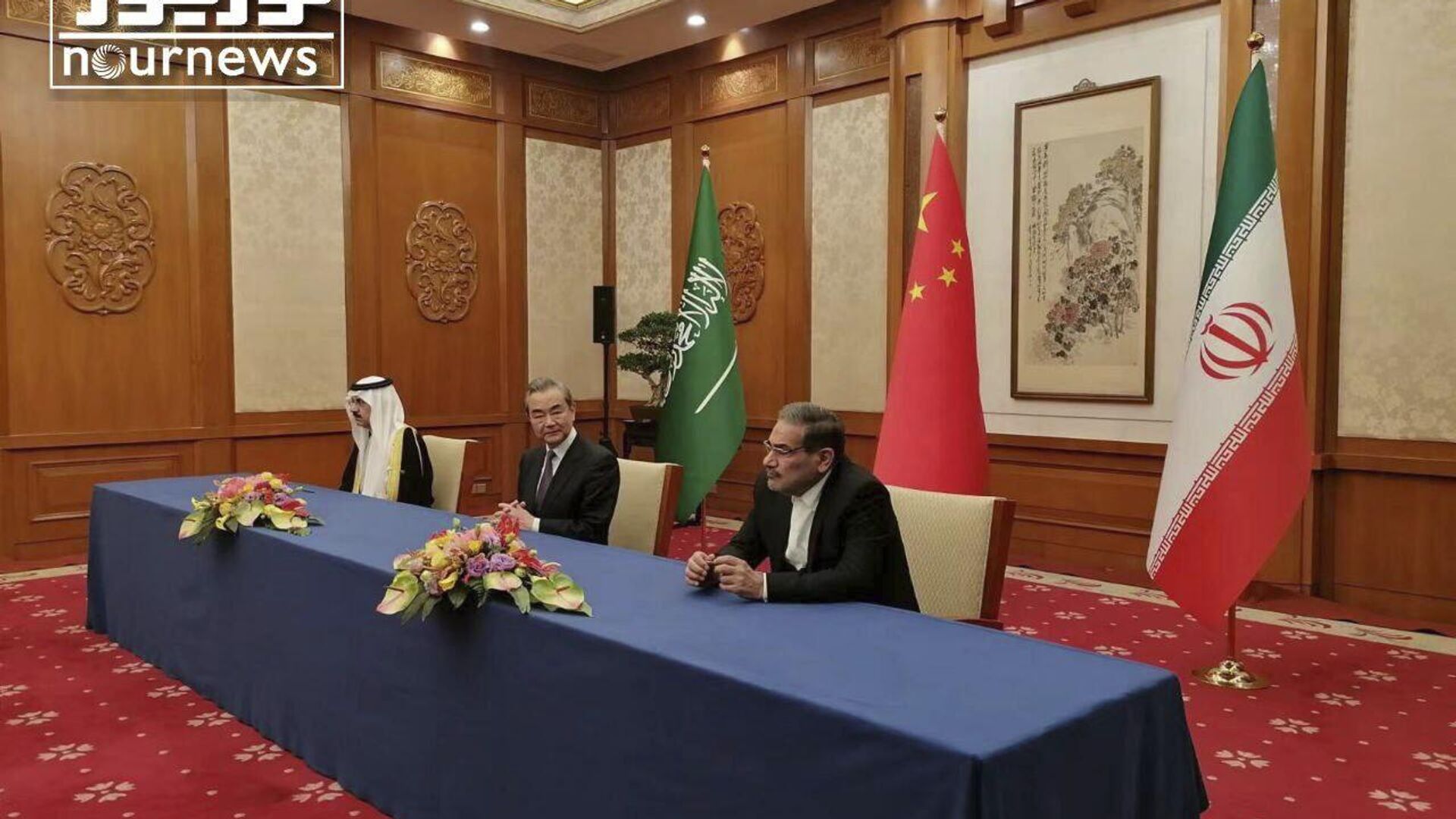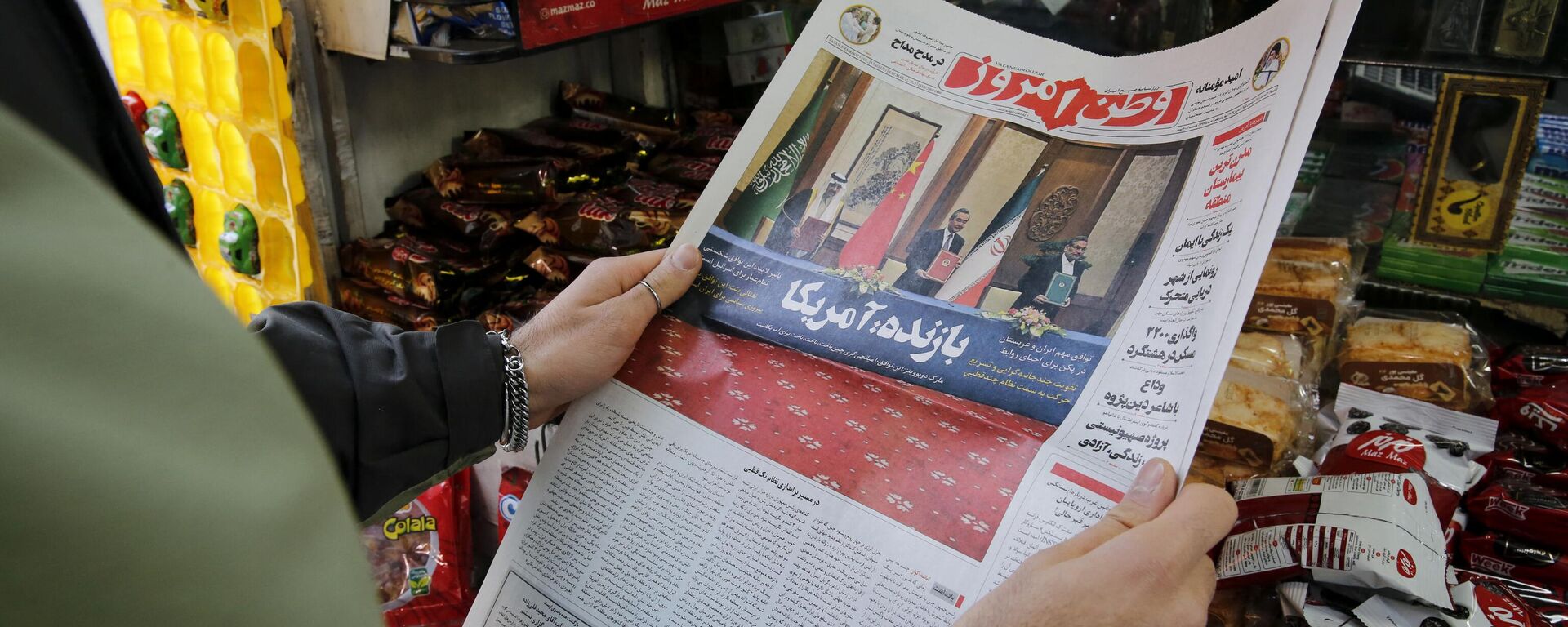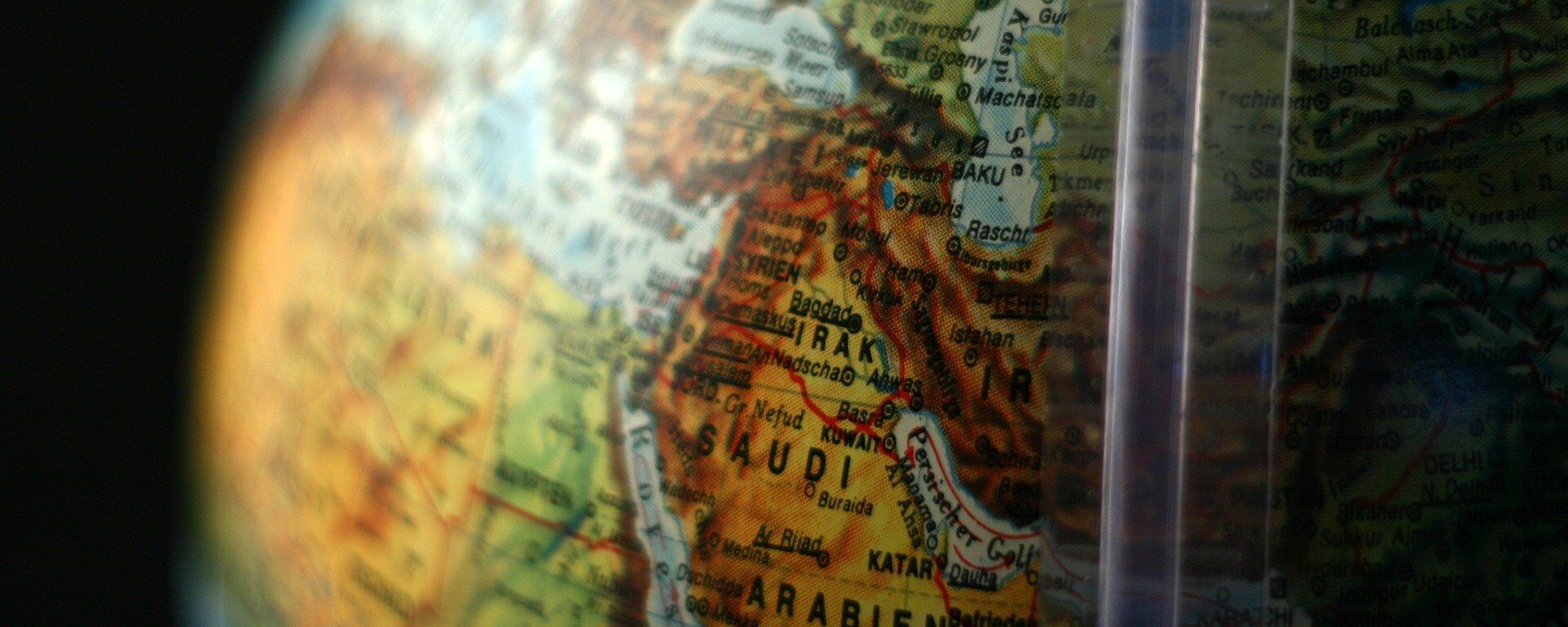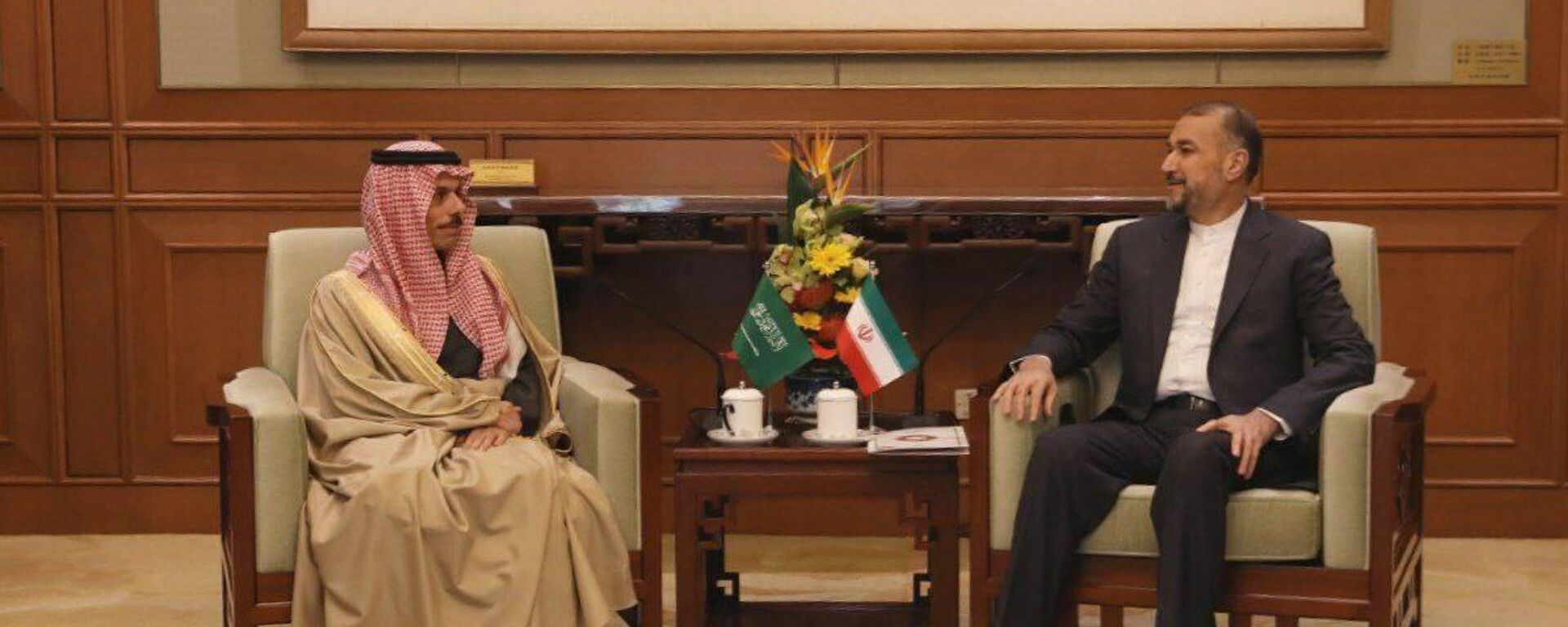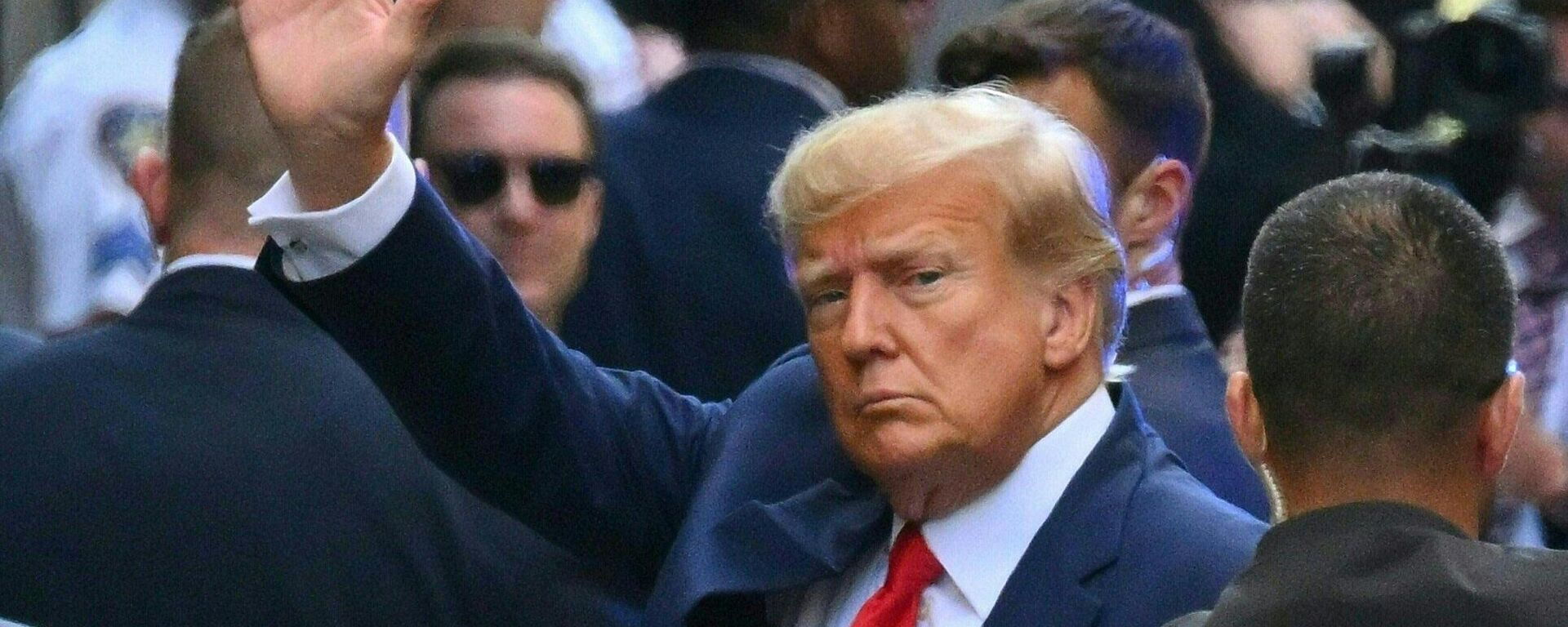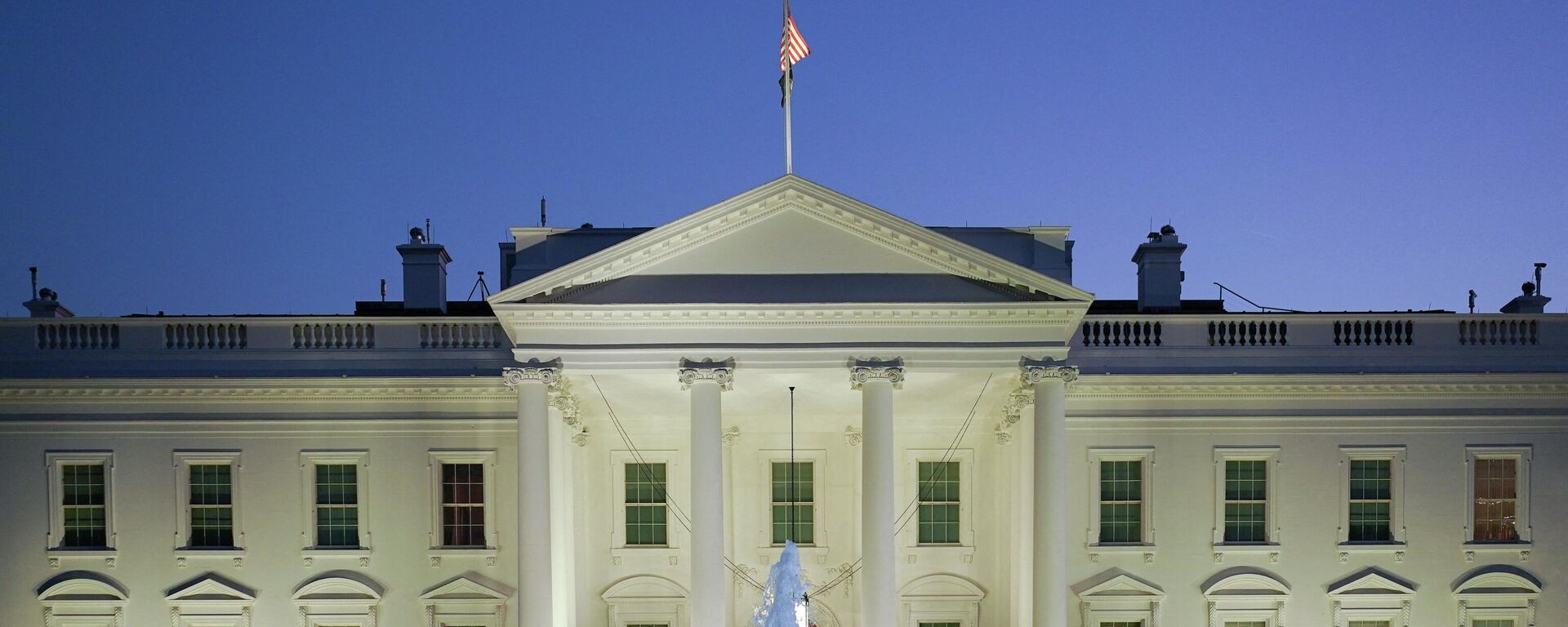https://sputnikglobe.com/20230407/chinas-saudi-iran-deal-indicates-us-no-longer-pulling-mideast-strings-1109246891.html
China's Saudi-Iran Deal Indicates US No Longer Pulling Mideast Strings
China's Saudi-Iran Deal Indicates US No Longer Pulling Mideast Strings
Sputnik International
Saudi Arabia and Iran held a high-level meeting in Beijing on April 6 and signed an agreement to reopen embassies and consulates following a breakthrough deal... 07.04.2023, Sputnik International
2023-04-07T16:51+0000
2023-04-07T16:51+0000
2023-04-07T17:01+0000
analysis
us
middle east
opinion
iran
saudi arabia
peace deal
ukraine
embassies
joint comprehensive plan of action (jcpoa)
https://cdn1.img.sputnikglobe.com/img/07e7/03/0a/1108275765_0:120:1280:840_1920x0_80_0_0_57d0b17ed6b36ad1130c9235ae4c03c9.jpg
"Iran has been trying to reestablish relations with Saudi Arabia and other Persian Gulf states for a number of years, as made evident in President Rouhani’s 2019 proposal called the Hormuz Peace Endeavor, or HOPE," Mehran Kamrava, professor of government at Georgetown University in Qatar, told Sputnik. "President Raisi came to office declaring that improving relations with Iran’s Arab neighbors was also a top priority. The question then becomes: Why did the Saudis decide on normalization of relations now?"As per Kamrava, a few factors are at play here: first, the Iranians may help the Saudis to settle their longstanding conflict with the Houthis in Yemen; second, Saudi Arabia has realized that Iran is "a permanent neighbor, whereas the United States is an impermanent friend."Both Tehran and Riyadh were interested in ending hostilities, echoed Iranian-American activist and scholar Leila Zand.On March 10, Iran and Saudi Arabia announced that they had agreed to re-establish diplomatic ties after years of hostilities. At the time, the two Middle Eastern powers signaled their intent to re-open their respective embassies and re-implement a 22-year old security pact under which Tehran and Riyadh agreed to cooperate on terrorism, drug-smuggling and money-laundering.China's Role as Peace BrokerThe breakthrough became China's first major diplomatic victory in the Middle Eastern region which has long been considered Washington's domain of influence.The professor admitted that Beijing's mediation of the Middle Eastern row had come out of the blue: "China has traditionally not been a diplomatic presence in the Middle East, and this is an important development," he noted.Earlier, Beijing maintained working relations with both powers. In March 2021, China concluded a 25-year strategic cooperation agreement with Iran. "Both Iran and Saudi Arabia, of course, trade a great deal with China, and therefore there is significant influence that China can bring to bear on both states," the professor noted.Beijing has its own interest in mediating peace in the troublesome Middle Eastern region: on the one hand, it needs interrupted energy deliveries from the Persian Gulf; on the other hand, the region plays an important part in Beijing's ambitious Belt and Road Project.China sees peace as a vital condition for both domestic and global economic development. To that end, the Chinese leadership issued the country's new Global Security Initiative. The document, which was published in late February, lays out practical measures to address current security challenges and maintain peace around the world.US Losing Grip in Middle EastThe Saudi-Iranian deal brokered by China is a clear indication that Washington is losing its grip in the Middle East and elsewhere in the word, according to Mehran Kamrava.One should bear in mind that up until nowadays the United States has been the only power where it called itself as a mediator in various areas in the Middle East, including Israel, Palestine, for Egypt, noted Leila Zand.However, the Trump administration damaged relations with Tehran, while his successor, Joe Biden, almost ruined ties with the Saudi royals, most notably, Saudi Crown Prince Mohammad bin Salman. OPEC+'s latest decision to further cut oil production was seen by some observers as a slap in the face of the Biden administration.To complicate matters further, the US has been dragged into internal power struggle and failing to manifest itself as an influential player in the region, according to Al Ibrahim.Washington is by no means enthusiastic about China's growing influence in the Middle East. Instead of hailing the settlement process between Iran and Saudi Arabia, some DC-based scholars lamented the fact that the Iran-Saudi Arabia détente could complicate efforts by the US and Israel to "strengthen a regional alliance to confront Iran" referring to Tehran's nuclear program.Last year, the Biden administration largely froze negotiations over the revival of the 2015 Joint Comprehensive Plan of Action, commonly known as the Iran nuclear deal, which Washington unilaterally tore apart. Then-US President Donald Trump withdrew from the deal in 2018 even though Tehran fully observed the accord. In response, Iran started to loosen the requirements of the deal concerning the enrichment of uranium.On April 3, Axios reported that the Biden administration had recently been in discussion with its European and Israeli partners about striking a deal with Iran that would include some sanctions relief in exchange for Tehran freezing parts of its nuclear program. The effort followed the International Atomic Energy Agency's February report alleging that Iran had amassed 87.5 kilograms of 60% enriched uranium.It appears that the newly brokered Saudi-Iran détente could prompt the Biden administration to bring the issue of negotiations with Tehran back on the table after Washington suspended the nuclear talks and openly supported protests against the Iranian government last year.Meanwhile, it's likely that China may help diplomatically resolve other longstanding conflicts in the Middle East, according to Jeff J. Brown. However, it will take time, he added.
https://sputnikglobe.com/20230311/china-brokered-iran-saudi-deal-threatens-to-push-us-out-of-the-gulf-and-washington-knows-it-1108298905.html
https://sputnikglobe.com/20230312/praising-iran-saudi-pact-china-says-agreement-will-help-rid-region-of-external-interference-1108316681.html
https://sputnikglobe.com/20230406/foreign-ministers-of-saudi-arabia-and-iran-meet-in-beijing--1109187679.html
https://sputnikglobe.com/20230407/judge-napolitano-dems-want-trump-to-become-gop-nominee-to-make-him-lose-in-2024-1109234625.html
https://sputnikglobe.com/20230403/us-informs-israel-about-possibility-of-partial-nuclear-agreement-with-iran-1109094317.html
iran
saudi arabia
ukraine
Sputnik International
feedback@sputniknews.com
+74956456601
MIA „Rossiya Segodnya“
2023
News
en_EN
Sputnik International
feedback@sputniknews.com
+74956456601
MIA „Rossiya Segodnya“
Sputnik International
feedback@sputniknews.com
+74956456601
MIA „Rossiya Segodnya“
china peace broker, china mediated deal iran and saudi arabia, saudi arabia and iran signed agreement in beijing, china reconciliation, us losing influence in middle east, opec+ cut oil production, biden's relations with saudi arabia, iran nuclear deal, joint comprehensive plan of action, china diplomacy, china belt and road initiative
china peace broker, china mediated deal iran and saudi arabia, saudi arabia and iran signed agreement in beijing, china reconciliation, us losing influence in middle east, opec+ cut oil production, biden's relations with saudi arabia, iran nuclear deal, joint comprehensive plan of action, china diplomacy, china belt and road initiative
China's Saudi-Iran Deal Indicates US No Longer Pulling Mideast Strings
16:51 GMT 07.04.2023 (Updated: 17:01 GMT 07.04.2023) Saudi Arabia and Iran held a high-level meeting in Beijing on April 6 and signed an agreement to reopen embassies and consulates following a breakthrough deal to end years of hostilities last month, mediated by China.
"Iran has been trying to reestablish relations with Saudi Arabia and other Persian Gulf states for a number of years, as made evident in President Rouhani’s 2019 proposal called the Hormuz Peace Endeavor, or HOPE," Mehran Kamrava, professor of government at Georgetown University in Qatar, told Sputnik.
"President Raisi came to office declaring that
improving relations with Iran’s Arab neighbors was also a top priority. The question then becomes: Why did the Saudis decide on normalization of relations now?"
As per Kamrava, a few factors are at play here: first, the Iranians may help the Saudis to settle their longstanding conflict with the Houthis in Yemen; second, Saudi Arabia has realized that Iran is "a permanent neighbor, whereas the United States is an impermanent friend."
Both Tehran and Riyadh were interested in ending hostilities, echoed Iranian-American activist and scholar Leila Zand.
"So on one hand we have Iran that is suffering from the financial conditions that they are dealing with due to sanctions and they want to break the isolation and come back to the community, the international community," Zand told Sputnik. "On the other hand, we have Saudi Arabia looking for the project they have for 2030 year [Vision 2030 – Sputnik]. (…) Both of these sides make them to just be ready for a direct negotiation and direct dialogue. And I guess it has the positive consequences and positive impact for the whole region, not for if not only for the two nations."
On March 10, Iran and Saudi Arabia announced that they had agreed to
re-establish diplomatic ties after years of hostilities. At the time, the two Middle Eastern powers signaled their intent to re-open their respective embassies and re-implement a 22-year old security pact under which Tehran and Riyadh agreed to cooperate on terrorism, drug-smuggling and money-laundering.
China's Role as Peace Broker
The breakthrough became China's first major diplomatic victory in the Middle Eastern region which has long been considered Washington's domain of influence.
"This is certainly a significant accomplishment for Chinese diplomacy, and perhaps the start of a more proactive diplomatic posture that China will take in future regional issues in the Persian Gulf and the broader Middle East," said Kamrava.
The professor admitted that Beijing's mediation of the Middle Eastern row had come out of the blue: "China has traditionally not been a diplomatic presence in the Middle East, and this is an important development," he noted.
Earlier, Beijing maintained working relations with both powers. In March 2021, China concluded a 25-year strategic cooperation agreement with Iran. "Both Iran and Saudi Arabia, of course, trade a great deal with China, and therefore there is significant influence that China can bring to bear on both states," the professor noted.
"The major difference between China and the United States seems to be in the relatively hands-off approach that China is adopting. One doesn’t see Chinese officials linking their diplomacy with calling for regime change, as the United States has so often done. However, this does not mean that China will necessarily be able to resolve other conflicts, simply because of the very complex nature of some of these. However, any fair diplomatic method should be encouraged," M. V. Ramana, the Simons Chair in Disarmament, Global and Human Security at the School of Public Policy and Global Affairs and the director of the Liu Institute for Global Issues at the University of British Columbia, told Sputnik.
Beijing has its own interest in mediating peace in the troublesome Middle Eastern region: on the one hand, it needs interrupted energy deliveries from the Persian Gulf; on the other hand, the region plays an important part in Beijing's ambitious Belt and Road Project.
"China is building the New Silk Road, that's going to take Iran through the Middle East onto Europe," Ahmed Al Ibrahim, a Riyadh-based political analyst, told Sputnik. "So this is also something that to look forward to, economically in order, basically, to zero that whole region's problem. So China has a lot to do with that, and China wants to give to the region the trust that America has not given, and they want it to work."
China sees peace as a vital condition for both domestic and global economic development. To that end, the Chinese leadership issued the country's new Global Security Initiative. The document, which was published in late February, lays out practical measures to address current security challenges and maintain peace around the world.
"Since Xi Jinping became president ten years ago, China has been on a 365-days-a-year diplomatic onslaught across every nook and cranny on Earth, while being one of KSA’s most loyal hydrocarbon customers," Jeff J. Brown, author of The China Trilogy, editor at China Rising Radio Sinoland and co-founder and curator of the Bioweapon Truth Commission, told Sputnik. "Thus, official and commercial ties are underestimated by the West and off the mainstream radar. What pushed China to move into the limelight is, of course, the West’s self-inflicted disaster in Ukraine and the global majority’s refusal to heed NATO’s sanctions. In any case, Chinese relations have always been about mutual benefit and respect, going back millennia."
US Losing Grip in Middle East
The Saudi-Iranian deal brokered by China is a clear indication that Washington is losing its grip in the Middle East and elsewhere in the word, according to Mehran Kamrava.
"The American influence in the Middle East, and elsewhere in the world, is on the decline, and Saudi Arabia’s decision to normalize ties with Iran is definitely an indication of that," Kamrava said. "By itself, Iran-Saudi normalization does not indicate the emergence of a multipolar world, so Saudi Arabia is still likely to remain fundamentally in the American orbit. But what we do see is a greater degree of willingness to defy implicit, and perhaps even explicit, American wishes and strategic objectives."
One should bear in mind that up until nowadays the United States has been the only power where it called itself as a mediator in various areas in the Middle East, including Israel, Palestine, for Egypt, noted Leila Zand.
However, the Trump administration damaged relations with Tehran, while his successor, Joe Biden, almost ruined ties with the Saudi royals, most notably, Saudi Crown Prince Mohammad bin Salman. OPEC+'s latest decision to further cut oil production was seen by some observers as a slap in the face of the Biden administration.
"Saudi Arabia felt that it needed to work for their own interests," Zand noted. "And from the perspective of the US, when as an American, my American part is looking at that and I don't like what has happened because it shows that my country was not diplomatically equipped and was not a good mediator. It was not a peacemaker in order to build the relationship between the countries."
To complicate matters further, the US has been dragged into internal power struggle and failing to manifest itself as an influential player in the region, according to Al Ibrahim.
"The US influence in the Middle East has declined, not because the Middle East is trying, or the GCC country or Saudi Arabia is trying to go away from the United States," said the Riyadh-based analyst. "No, it's the United States who is pulling out of the region for many reasons (...) [but] also the conflict internally between the Democrats and the Republicans who are so divided."
Washington is by no means enthusiastic about China's growing influence in the Middle East. Instead of hailing the settlement process between Iran and Saudi Arabia, some DC-based scholars lamented the fact that the Iran-Saudi Arabia détente could complicate efforts by the US and Israel to "strengthen a regional alliance to confront Iran" referring to Tehran's nuclear program.
Last year, the Biden administration largely froze negotiations over the revival of the 2015 Joint Comprehensive Plan of Action, commonly known as the Iran nuclear deal, which Washington unilaterally tore apart. Then-US President Donald Trump withdrew from the deal in 2018 even though Tehran fully observed the accord. In response, Iran started to loosen the requirements of the deal concerning the enrichment of uranium.
On April 3, Axios reported that the Biden administration had recently been in discussion with its European and Israeli partners about striking a deal with Iran that would include some sanctions relief in exchange for Tehran freezing parts of its nuclear program. The effort followed the International Atomic Energy Agency's February report alleging that Iran had amassed 87.5 kilograms of 60% enriched uranium.
It appears that the newly brokered Saudi-Iran détente could prompt the Biden administration to bring the issue of negotiations with Tehran back on the table after Washington suspended the nuclear talks and openly supported protests against the Iranian government last year.
Meanwhile, it's likely that China may help diplomatically
resolve other longstanding conflicts in the Middle East, according to Jeff J. Brown. However, it will take time, he added.
"The KSA-Iran détente should be followed by similar agreements with the other Gulf State monarchies," Brown said, projecting that a new world order will take shape with the Global South playing an important role in it. "Thanks to the geopolitical catalyst in Ukraine, with Washington and Brussels making one god-awful mistake after another, this is inspiring Africa, Latin America, Asia and Oceania to start standing tall against 500 years of colonial imperialism and shout, 'Look, the Western king wears no clothes'!"
